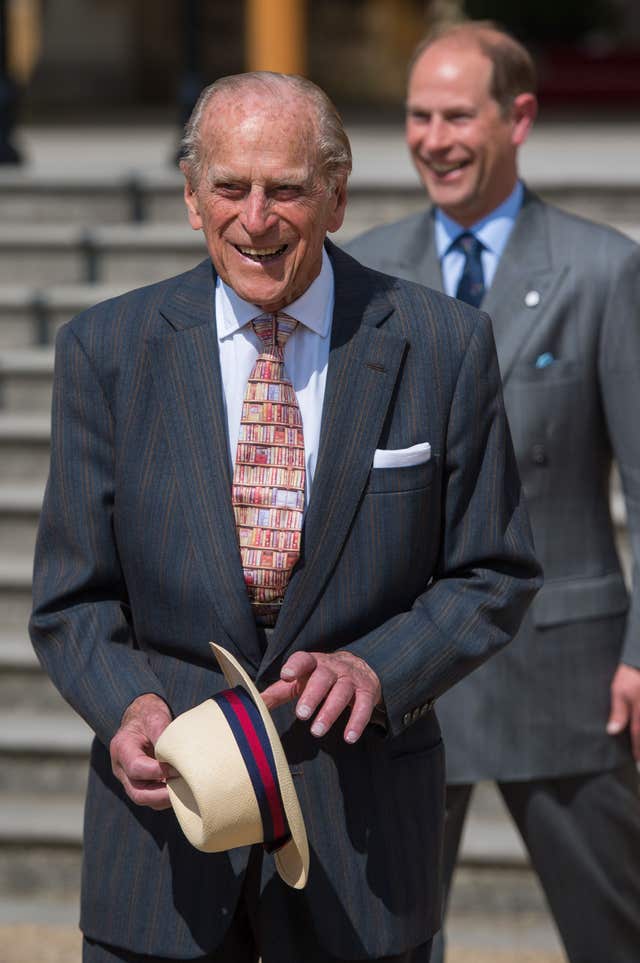
The King has handed his late father’s title the Duke of Edinburgh to his brother Prince Edward, honouring the late Queen and Philip’s wishes.
Charles conferred the title on the former Earl of Wessex in celebration of Edward’s 59th birthday on Friday.
Sophie, the former Countess of Wessex, is now the Duchess of Edinburgh and their 15-year-old son James, Viscount Severn is the new Earl of Wessex.
 The new Duke and Duchess of Edinburgh (David Parry/PA)
The new Duke and Duchess of Edinburgh (David Parry/PA)
It comes after another title change this week when the Duke and Duchess of Sussex began officially using the titles Prince and Princess for their children Archie and Lilibet.
The new duke and duchess will be in Edinburgh – their first outing with their new titles in the city which inspired their name – later on Friday at a reception to mark the first year of conflict in Ukraine
READ MORE: Edinburgh named among ‘25 most beautiful cities in world'
Buckingham Palace said in a statement: “His Majesty The King has been pleased to confer the Dukedom of Edinburgh upon the Prince Edward, on the occasion of HRH’s 59th birthday today.
“The title will be held for HRH’s lifetime.
“The dukedom was last created for Prince Philip in 1947, upon his marriage to Princess Elizabeth, who
held the title of Duchess of Edinburgh before acceding to the throne in 1952.
“The new Duke and Duchess of Edinburgh are proud to continue Prince Philip’s legacy of promoting
opportunities for young people of all backgrounds to reach their full potential.”
The dukedom – which in the past has been hereditary – will not, however, pass down to the Edinburghs’ son James when Edward dies.
Viscount Severn will become the Earl of Wessex and Forfar when the title of The Duke of Edinburgh reverts to the Crown, the Palace said.
Edward will also remain for his lifetime the Earl of Forfar, another of his titles, but will use the Duke of Edinburgh because it is the more senior Scottish title.
 The Duke of Edinburgh (left) and his son Edward (PA)
The Duke of Edinburgh (left) and his son Edward (PA)
Philip had always wanted his youngest son Edward to inherit his title, but the decision ultimately was down to Charles as King.
When Prince Edward and Sophie Rhys-Jones married in 1999, they were given the titles the Earl and Countess of Wessex.
But Buckingham Palace also announced Edward would eventually one day succeed his father as the Duke of Edinburgh – but not until after the death of both Philip and the Queen.
READ MORE: Edinburgh music store owner is work of art
The palace said at the time: “The Queen, the Duke of Edinburgh and Prince of Wales have also agreed that the Prince Edward should be given the dukedom of Edinburgh in due course when the present title now held by Prince Philip eventually reverts to the Crown.”
In keeping with the Letters Patent issued when King George VI gave Philip the title in 1947, Charles inherited the Edinburgh dukedom when Philip died – but he did not use it.
On the death of the Queen six months ago, Charles acceded to the throne and the title merged with the crown and could be granted to someone to someone else.
But despite agreeing to his father’s wishes in 1999, Charles was reported to be reluctant to hand the dukedom over to Edward when he became king.
He is known to be in favour of a slimmed-down monarchy.
Edward appeared to be aware of the uncertainty, hinting in a TV interview in the aftermath of Philip’s death: “It was sort of a pipe dream of my father’s… and of course it will depend on whether or not the Prince of Wales, when he becomes king, whether he’ll do that.”
To grant it to Edward, Charles will need to issue a new Letters Patent – a document from a sovereign issued under the Great Seal of the Realm.



Why are you making commenting on The Herald only available to subscribers?
It should have been a safe space for informed debate, somewhere for readers to discuss issues around the biggest stories of the day, but all too often the below the line comments on most websites have become bogged down by off-topic discussions and abuse.
heraldscotland.com is tackling this problem by allowing only subscribers to comment.
We are doing this to improve the experience for our loyal readers and we believe it will reduce the ability of trolls and troublemakers, who occasionally find their way onto our site, to abuse our journalists and readers. We also hope it will help the comments section fulfil its promise as a part of Scotland's conversation with itself.
We are lucky at The Herald. We are read by an informed, educated readership who can add their knowledge and insights to our stories.
That is invaluable.
We are making the subscriber-only change to support our valued readers, who tell us they don't want the site cluttered up with irrelevant comments, untruths and abuse.
In the past, the journalist’s job was to collect and distribute information to the audience. Technology means that readers can shape a discussion. We look forward to hearing from you on heraldscotland.com
Comments & Moderation
Readers’ comments: You are personally liable for the content of any comments you upload to this website, so please act responsibly. We do not pre-moderate or monitor readers’ comments appearing on our websites, but we do post-moderate in response to complaints we receive or otherwise when a potential problem comes to our attention. You can make a complaint by using the ‘report this post’ link . We may then apply our discretion under the user terms to amend or delete comments.
Post moderation is undertaken full-time 9am-6pm on weekdays, and on a part-time basis outwith those hours.
Read the rules hereLast Updated:
Report this comment Cancel